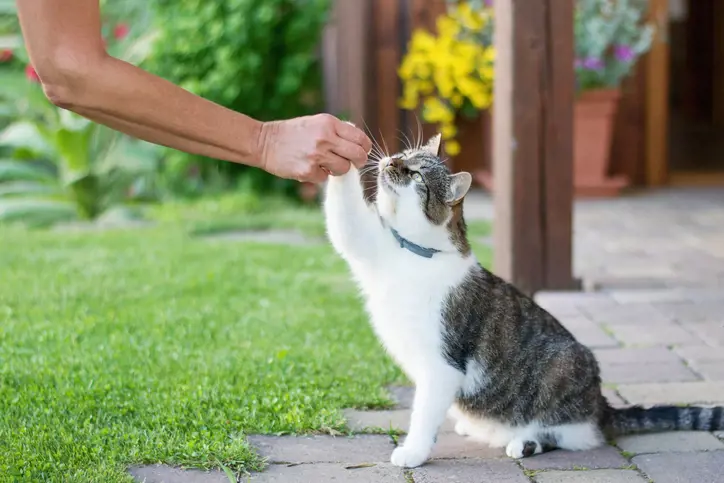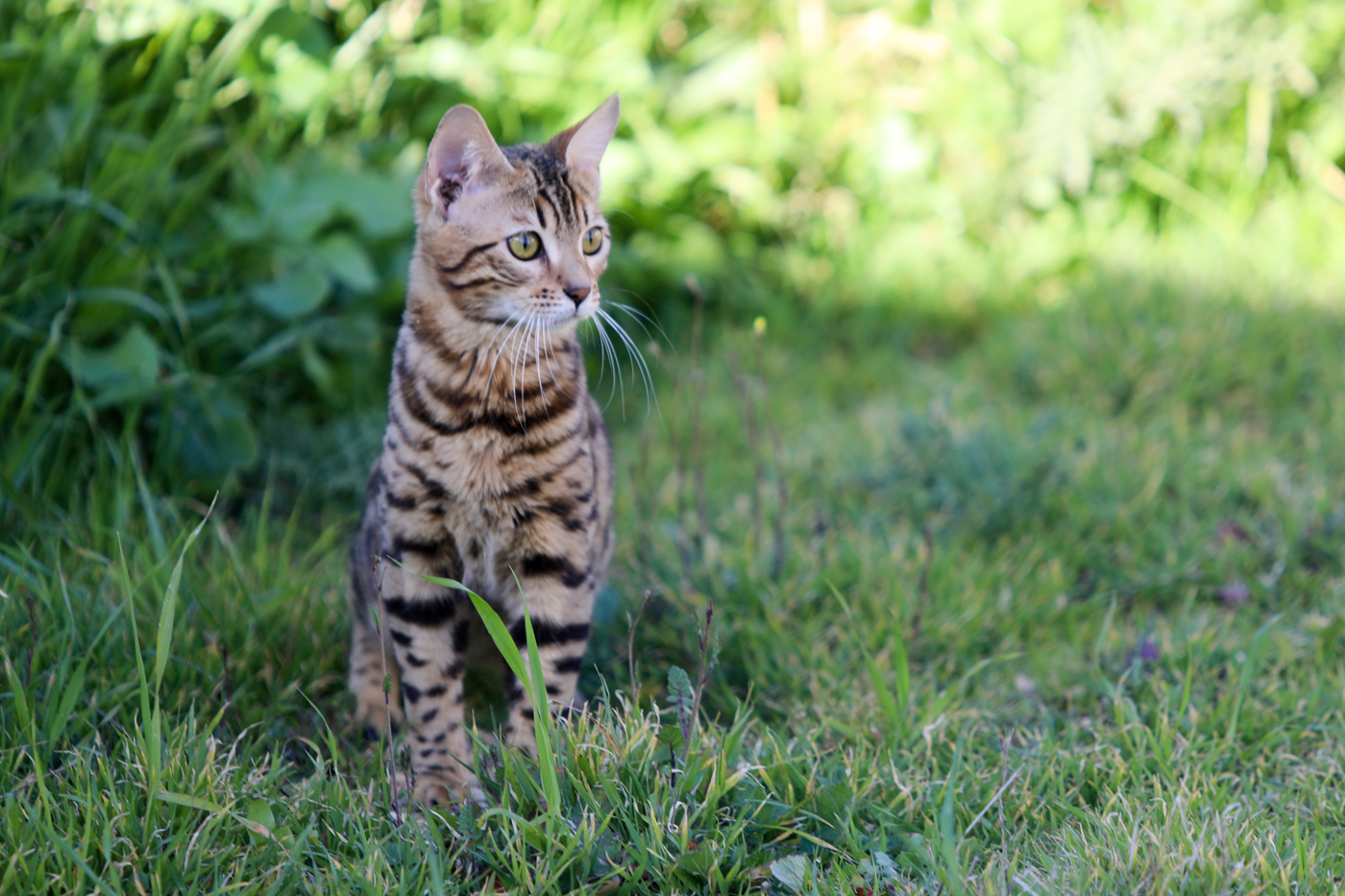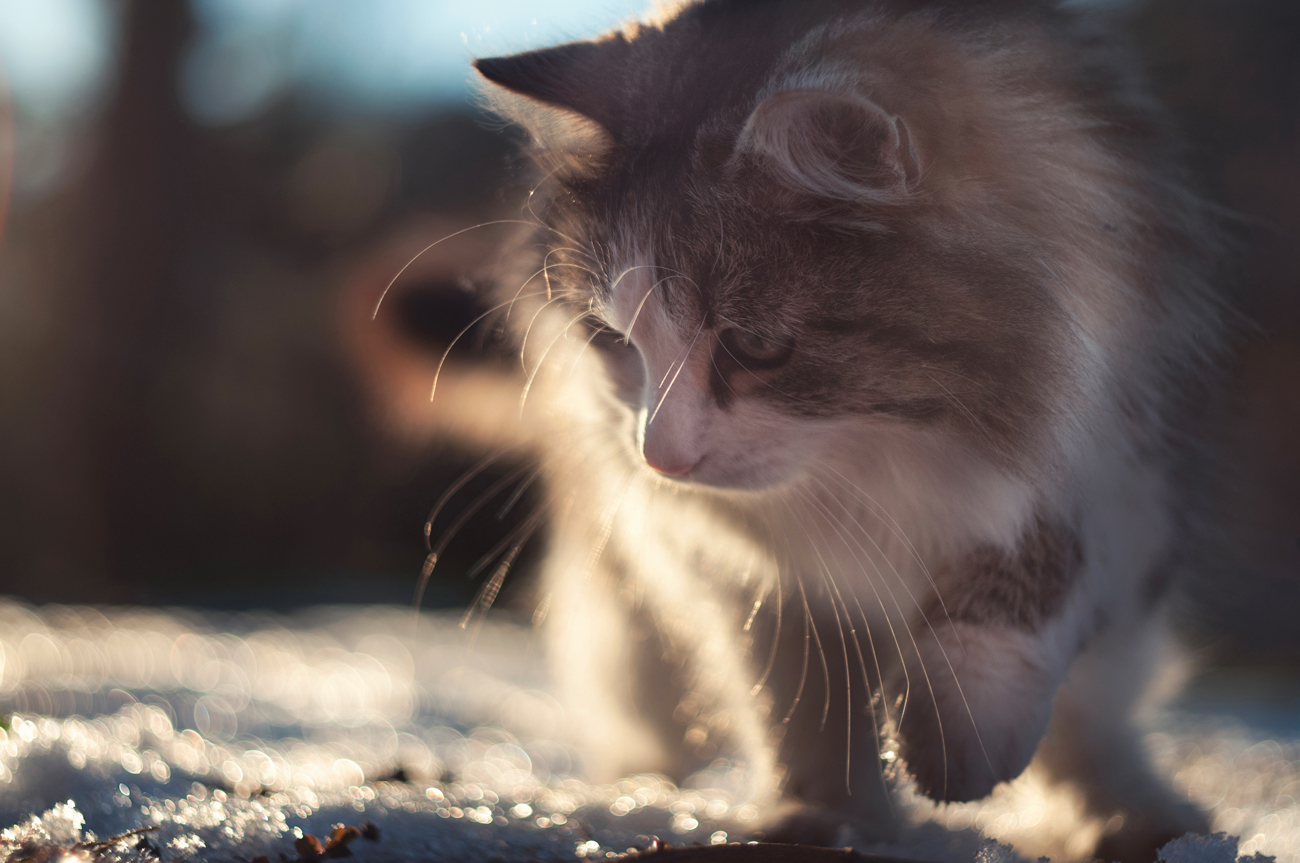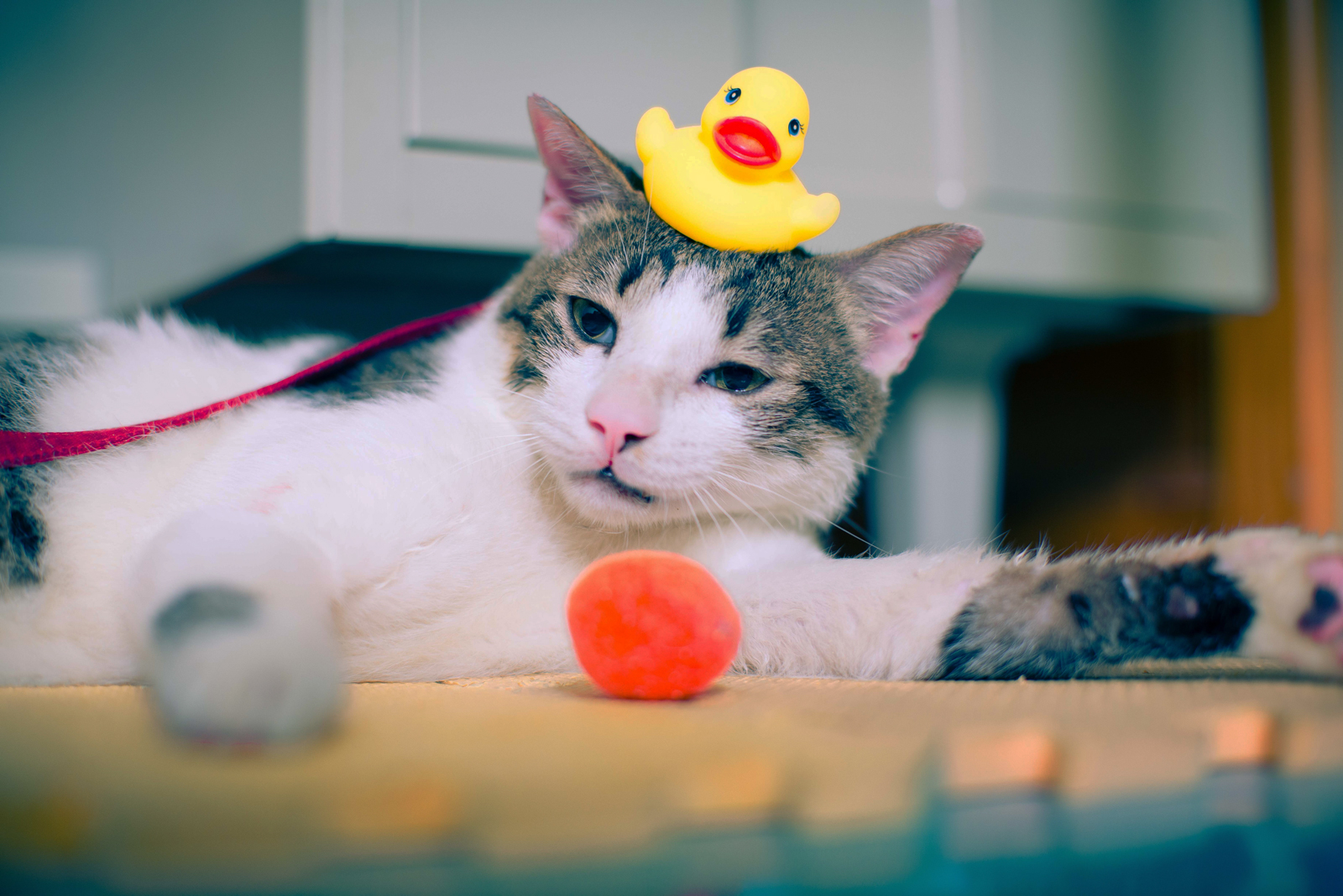How smart is your cat?
16th July, 2021

There are so many things we love about our pet cats: their purring, their crazy antics, their beauty, and their ability to rid our houses of mice with one hard stare.
But few owners credit their cats with much intelligence – let alone try to train them!
So are we right to assume that our feline friends are lacking in the brains department? Or could there actually be a fine mind hidden behind those adorable furry features?
Read on to learn about why researchers think we could be underestimating our pets, and how yours could pick up a surprising number of skills with the right teaching.
And remember: even the cleverest kitty still gets into some pretty foolish scrapes from time to time, so make sure yours is protected with insurance for cats.
Types of intelligence
First things first: when we talk about feline intelligence, we don’t mean rocket science. Your cat is never going to win the Nobel Prize, unless the awards panel introduces a new Cuteness category.
Instead, we need to look at things in cat terms.
Researcher Dr Kristyn Vitale, from Oregon State University, tells Reader’s Digest that we should make a distinction between ‘cognition’, which is how a cat thinks about something; and ‘intelligence’, which is how they act upon that thinking in a way we humans might recognise as smart.
Up until recently, research has explored cats’ physical cognition: how they use their senses to interpret their world. In cats, hearing and smell are more acute than in humans, so they’ll pick up on things you can’t perceive.
But increasingly, researchers are looking into social cognition: how cats understand and act upon social stimuli in their environment. That includes reading cues from their human owners.
So if spelling and maths tests are out, how can you find out if you’ve got a quick-witted kitty? Let’s take a look at different ways that cats can demonstrate their intelligence, and how you can find out if yours is a feline genius.

Testing your cat’s intelligence
What you’re looking for are signs that a cat is quick to learn new tricks, can solve problems, can differentiate between items or events, or can respond to your cues.
Of course, it’s generally harder to detect these in cats than in their canine counterparts. Dogs are eager to please, so will demonstrate their skills to their humans if they think it will earn them praise or a reward. Cats, however, are often too cool for school.
And some of these tests will only be passed by cats who’ve been socialised with humans from an early age. If yours is a rescue cat which spent its early years as a stray, then it might well not pick up on certain cues.
So try these eight tests on your kitty, but don’t be dismayed if it just slinks off, tail in the air. Don’t try to force it – you’ll just create tension.
Does your cat respond to its name?
While dog owners are often encouraged to give their pets a strong, one-syllable name that can be called easily, no such recommendations exist for cat parents. That’s because we tend to assume that cats don’t learn their own names.
But research carried out in Japan suggests otherwise – and you can replicate the methods with your own moggy.
Pick four words that are similar in length and intonation to your own cat’s name. Then say them to your cat, adding its name onto the end.
Does it respond more enthusiastically to its own name than to the other random words, perhaps simply by twitching its tail? If so, your smart cookie might have learned its own name.
Of course, if you use this name to call it in for its mealtimes, your cat might simply associate the word with food rather than itself. But it’s a start!
Don’t set your expectations too high. The Japanese researchers also found that even if cats appear to recognise their names, they don’t actually pay much attention to them. Many simply stalk off if there’s no food on offer!
Therefore, you can’t rely on calling your cat’s name as a way to get it indoors at night. Cats love to roam, and some unfortunately get lost. Insurance for a cat can help you cover the costs of reuniting you with your adventurous kitty.
Can your cat tell the time?
You’d be unwise to rely on your puss to make sure you catch a plane or get to an essential business appointment on time. But in general terms, most cats have a rough idea what time of day it is.
Of course, like most animals, they recognise night and day – and they’re especially keen on dusk, which is prime hunting time!
But they’re also likely to learn their mealtimes – and wake you up if you oversleep at breakfast time!
This is called ‘associative learning’, and it’s a sign that they’ve adapted to living with humans.

Does your kitty understand ‘object permanence’?
Some moggies may give the impression that they only care about their owners’ existence when they want to be fed or can’t be bothered to use the cat flap. But do they actually know you still exist even when you’re not tending to their every whim?
The idea that something is there even when we can’t see it is a concept that human babies tend to grasp at around four to seven months of age. It’s one of the building blocks of human knowledge.
Now, kittens can do plenty of things that human babies can’t: walk, jump, and fend for themselves to a certain degree – though it’s wise to get cat insurance to cover them for any accidents.
But do they understand object permanence? Here’s a test to find out.
Start playing with your cat using a favourite toy. When your pet is really engaged in the game, place the toy behind an object while your cat looks on. Does your kitty then go straight for the hiding place to retrieve the toy? If so, it’s aware that the toy didn’t suddenly cease to exist.
Of course, now you’ve got to reward your clever kitty by continuing to play the game. Best to try out this test when you’ve got the time and the patience!
Does your cat pick up on your emotions?
Cats are wonderful creatures – but not known for their empathy. If you want a pet which understands when you’re feeling down and snuggles up to give you comfort, then get a dog.
But that’s not to say that cats are completely immune to their owners’ emotions.
Dr Vitale has tested cats to see if they pick up on their owners’ fears or joys by placing a fan with streamers in a room. This is an item that a cat won’t have encountered before, and might well find frightening.
She asked owners to then act frightened or happy towards the object, and observed their cats’ reactions. Socially intelligent animals are likely to pick up on human cues, and act the same way as their owners do.
Sometimes a cat may mimic the behaviours of a child, so in order to keep both your cat and child safe, read our blog on this.
Can your cat solve problems?
Sometimes, you’ll come across your cat at the top of a bookshelf and wonder how on earth it got there.
If your cat always gets the cream no matter how many padlocks you put on your fridge, chances are that it’s a very clever kitty indeed.
You are probably already aware if you’ve got a problem-solving puss. If you’re unsure, buy it some puzzle toys, and place treats inside. Or invent your own, placing treats into different objects to see how quickly your cat devises a snack-snaffling solution.
It’s always a good idea to find ways to stimulate your cat mentally. It’s particularly important once it gets older: as its hunting days dwindle, it needs other ways to remain alert and enjoy a rich life.
If your senior cat is showing signs of cognitive decline, do check with your vet to rule out other causes. With cat insurance from Purely Pets, you get access to a 24-Hour Vet Helpline for all your queries and concerns. And there’s no upper age limit for taking out a new policy.

Can your cat follow a pointing finger?
Pointing is a basic human cue – but a surprisingly large number of cats can follow this gesture, too, if given a little training at a young age.
If you always point to your puss’ food bowl to let it know that it’s time for dinner, then your cat is likely to associate the two. Use this next test to check that your cat is following your finger, not just the smell of the food.
Place two treats underneath two upturned cups, and point to one of them. If your cat goes to the one you point to, reward it with the treat. If it goes to the other cup, don’t give it a reward.
See how quickly your cat will learn to follow your finger rather than just the smell. Repeat the test 10 times: if your cat follows your finger on seven occasions or more, chances are that it’s a sharp-witted animal.
If your cat seems to be scoring well on this test, you might be able to train it to accomplish further feats of feline brilliance – especially if it’s just a young kitten. Read on for more suggestions.
Can your cat tell shapes apart?
Could your cat be a secret geometrician? This might seem like a far-fetched idea, particularly if yours regularly misjudges gaps and gets stuck behind your washing machine. But why not put it to the test?
Simply cut out a large paper circle and a square the same size, and place them in front of your cat. If it taps either one, give it a treat. Once it’s used to tapping, pick a shape to train your cat to recognise – and reward it only when it taps that one.
A pet that’s quick on the uptake is likely to be a very clever cat indeed.
It’s tempting to think that an animal of such superior intellect would never fall out of a tree or get into a scrap with a cat three times its size, but don’t be so sure. Get your pet covered by cat insurance.
Can your cat learn basic commands?
Even dim-witted dogs can learn to sit, stay, and get down. However, owners tend to think there’s no point in training cats – they’re not only free-spirited, but also highly stubborn. So is this true?
Dr Vitale says that her four cats know to sit, come and stand. One of them will even respond to commands to jump, high-five, ring a service bell and more.
While you might not have the patience for intensive cat training, it’s likely that you’ll want your cat to stop certain behaviours such as using its claws while playing with you, or scratching your furniture.
They key is to be persistent, calm, and use positive reinforcement – rewarding it with treats rather than punishment.
So every time your cat tries to claw your arm when you’re stroking it, remove your hand and stop stroking right away. If your cat retracts its claws, start stroking it again.
Of course, if cats could talk, they might dispute that obedience is a sign of intelligence. After all, they get all the meals, treats and snuggles that dogs get without sacrificing an ounce of independence or dignity!
Get a quote from Purely Pets today
No matter how perceptive – or otherwise – your puss is, it still needs the very best care from you.
Lifetime cat insurance from Purely Pets helps you cover the costs of vets’ fees, loss by theft or straying, special diets, complementary treatment and much more, depending on the policy you choose.
Plus, we offer online policy management and direct payment to vets, making it simpler for you to keep your clever cat covered.
Policy benefits, features and discounts offered may very between insurance schemes or cover selected and are subject to underwriting criteria. Information contained within this article is accurate at the time of publishing but may be subject to change.
Helpful Pages
Recent Posts
Pet Insurance Quote
- 98% claims paid *
- Claims paid directly to vets
- 24/7 vet video consultations
- Interest free monthly payments




